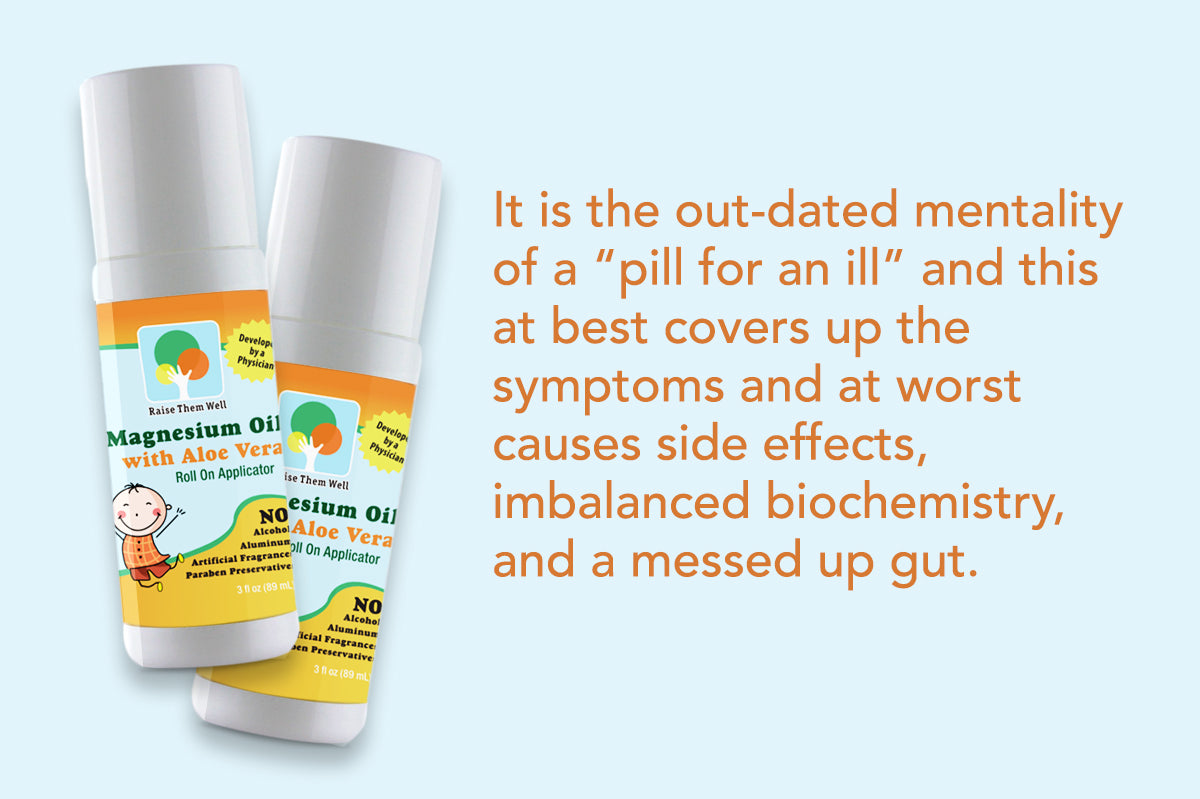I have been asked this questions numerous times from people when they are considering using Magnesium for their kids. I think that it is because it is not recommended nearly as often as pharmaceutical medications by doctors which, in my opinion, is depressing.
Instead of turning to one of the safest minerals on the planet, doctors will often recommend things like Miralax, Ritalin, Anti-depressants, Tylenol, Ibuprofen, and even Anti-psychotics without even thinking about trying Magnesium. It is the out-dated mentality of a “pill for an ill '' and this at best covers up the symptoms and at worst causes side effects, imbalanced biochemistry, and a messed up gut.

Why Magnesium is Important
Magnesium is essential for our health.
It is the 4th most common mineral in the body and is necessary for over 300 enzymatic reactions that help with:
- Production of protein, DNA and RNA
- Growth and development of bones
- Proper function of muscles, bones, nerves, and hormones
- Regulation of blood sugar, blood pressure, and energy
- Mood regulation, calmness and relaxation
Yet as much as 68% of Americans do not get enough magnesium in their diet to meet the minimum daily requirement of this important nutrient. [1, 2]
Getting enough magnesium is especially important for children because almost half of our peak bone mass develops during childhood and adolescence. And bone density is related to magnesium levels in our bodies.

How Much Magnesium Does A Child Need?
Minimum daily recommended amounts of magnesium depend on your child’s age and sex.
- Infants from birth to 6 months require at least 30 mg/day
- Infants from 7 to 12 months require at least 75 mg/day
- Children ages 1 to 3 years old require at least 80 mg/day
- Children ages 4 to 8 years old require at least 130 mg/day
- Children ages 9 to 13 years old require at least 240 mg/day
For more information about the minimum recommended daily allowance of magnesium for your child, please see the Magnesium Fact Sheet for Consumers available from the National Institutes of Health Office of Dietary Supplements.
Causes of Low Magnesium in Kids
Child’s Diet May Lead to Inadequate Intake
Kids can be picky eaters and may not eat magnesium rich foods such as nuts, seeds, legumes, whole grains, and green vegetables - especially dark leafy greens.
Diets High in Salt, Sugar and Soft Drinks
Salt, sugar, and phosphoric acid (found in soft drinks) all increase magnesium excretion.
Constant Growth and Development, High Activity Levels and Stress
Our bodies need more magnesium during periods of growth, development, physical activity, or illnesses that cause excessive sweating, vomiting, or diarrhea. Because kids are constantly growing and always on the move, their bodies need higher levels of magnesium for good health.
I routinely use Magnesium on my adult and pediatric patients. Its safety profile has been well established. Of course, too much of anything, can be a bad thing (too much water can actually kill you) but it is very difficult to get too much Magnesium.
The main side effect that children get when consuming Magnesium orally is diarrhea, which is also why it is so great for constipation. While this is not a major problem, it can definitely decrease compliance and there is a limit for how much the gut can absorb (this is called bowel tolerance). That is why for kids I am now recommending trans-dermal Magnesium (applied to the skin). This doesn’t cause the same diarrhea side effects, but still provides the benefits.
The beauty of trans-dermal Magnesium oil is that it is a gentle way to get kids the Magnesium that they need. Roll-on Magnesium oil is one of the most effective delivery systems for children because it isn’t a nasty tasting liquid you have to fight with them to swallow. Simply roll it on.
When applying Magnesium to the skin, it is absorbed through the skin and into the blood. Since this happens fairly quickly most of the time children will notice an improvement in their symptoms in 20-30 minutes.

However, like I said earlier, there can always be too much of a good thing.
The problem with most Magnesium oils is that they are super concentrated. We are talking about 3000mg/ounce of magnesium. While great for adults, this is too concentrated for kids. Not only may they get too much magnesium into their blood, but the super-concentrated magnesium will also cause their sensitive skin to burn and itch.
When formulating our Raise Them Well Magnesium Oil, we wanted to use enough Magnesium to still have an effect, but balance it with Aloe Vera so that it is gentle on the skin. Our magnesium oil has around 2000mg/ounce which seems to be the right concentration to balance efficacy and tolerance.
I would still recommend testing the Magnesium oil on a small part of skin (like the bottom of the feet) just to make sure that it interacts well with your child since everyone is unique.
So, if your child is dealing with any of these conditions:
- Constipation
- Anxiety
- Hyperactivity
- Sleep disturbances
- Fatigue
- Muscle pain
- Muscle cramps
- Headaches
- Aggression

Answers to Frequently Asked Questions About Magnesium Oil
I would recommend trying a Magnesium Oil. You have potentially a lot to gain and very little risk. Just make sure you choose one that is specifically formulated for kids.
If you’re interested in trying our Raise Them Well magnesium oil you can purchase it directly from us using this link. Our Magnesium Product FAQs provide answers to the most common questions we receive from parents, but please touch base with us if you have other questions about our products. We're always happy to help!
Blessings!
TAKE OUR QUIZ AND DISCOVER IF YOUR CHILD COULD BE DEFICIENT IN MAGNESIUM!
References:
1. Schwalfenberg, Gerry K., and Stephen J. Genuis. “The Importance of Magnesium in Clinical Healthcare.” Scientifica, Hindawi, 28 Sept. 2017, [Source].
2. Peterson, Melissa A. “Magnesium: A Vital Nutrient for Children.” FX Medicine, 25 June 2018, [Source].

